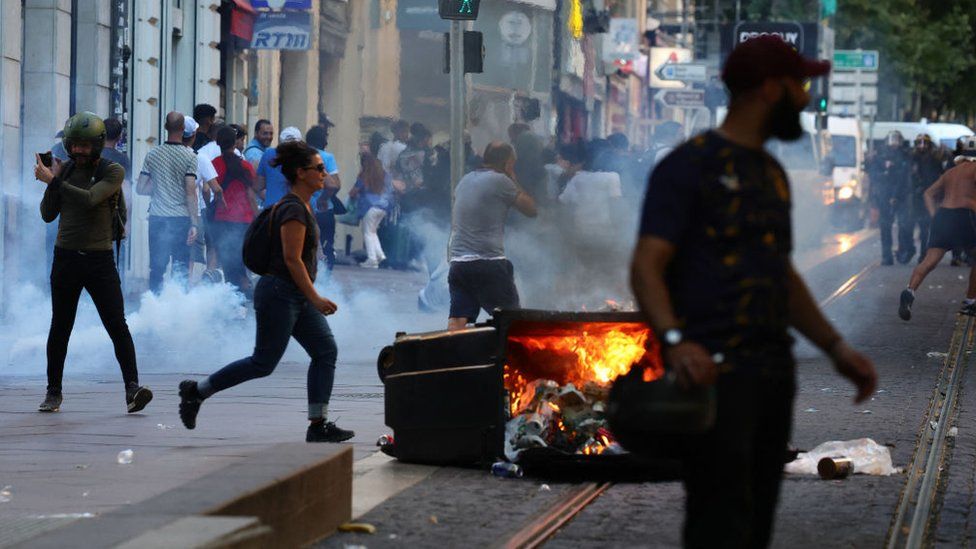A French policeman suspected of shooting a 22-year-old man in the head with a rubber bullet in riots in Marseille a month ago has been told he must stay in pre-trial detention.
The decision to detain the officer has prompted an outcry from colleagues across France.
Hedi, an assistant restaurant manager, was badly wounded and his skull disfigured by the “flash ball”.
The officer admitted to the court that he had fired his riot gun once.
However, the 35-year-old policeman, identified as Christophe, said he did not see anyone lying on the ground wounded and his lawyer told the court there was “no proof” he had hit him.
The suspect is one of a group of four policemen facing prosecution on a charge of violence by a group with authority, for what took place in early July during riots that erupted across France.
The unrest broke out after a 17-year-old called Nahel was shot dead by an officer at a traffic check in Nanterre near Paris.
Hedi, a North African immigrant, survived being wounded in the head but lost part of his skull. He has since described losing the sight of his left eye, having migraines and having to walk with a helmet.
The officer’s lawyer appealed to the court in Aix-en-Provence for his release. He was backed up by the head of national police as well as police unions.
But the prosecutor told the court it was clear from CCTV images that the victim had come under attack. He said the officer should remain in pre-trial detention because of the risk of “fraudulent collusion” with colleagues.
The judge ruled that there were serious indications of the officer’s involvement in the incident and despite his partial confession, his initial denial had discredited his entire account.
Hedi’s lawyer Jacques Preziosi welcomed the decision to keep him in custody. While the officer’s account was completely incoherent, he said “finally we have a confession that he fired the LBD… until now everyone denied it”.
Earlier this week government spokesman Olivier Véran phoned Hedi to wish him a good recovery.
The 22-year-old has told French media how he finished work at a restaurant in the early hours of 2 July and met up with his friend Lilian. They had been walking on the margin of the riots when they were confronted by four members of a police anti-crime brigade (BAC).
“We said good evening to [the police] but quickly realised they were annoyed and not interested in talking,” .
While his friend managed to escape, Hedi was shot in the head and fell to the ground. He remembers being dragged along the ground and beaten during an ordeal that went on for as long as five minutes: “I felt something enormous in my skull that was burning me.”
The rare decision by magistrates to remand one of the four police officers involved in the Marseille incident has led to widespread anger among other police.
An estimated 5% of police have taken sick leave or worked to rule in response to his detention.

National police chief Frédéric Veaux told Le Parisien newspaper that officers should not be treated as criminals or thugs.
“Ahead of an eventual trial, a police officer has no place in prison, even if he may have committed faults or grave error in his work,” he said.
President Emmanuel Macron said while he understood the strong feeling among police “no-one in the Republic is above the law”.
The case has yet again highlighted the use of “flash-ball” rubber bullets by French police, which has become highly controversial because of the number of life-changing injuries and even deaths inflicted in recent years.
The same night that Hedi was wounded, Mohamed Bendriss, 27, was shot in the chest during the Marseille protests. He suffered a cardiac arrest and died.
Prosecutors are investigating whether an LBD caused the scooter delivery driver’s death, but two marks were found on his chest and thigh typical of the impact of a “flash ball”.
His cousin Abdelkarim was hit in the eye the night before and may lose the sight of an eye.
In April, a man lost a testicle during a demonstration in Nantes against the government’s pension reforms.
Source : bbc


